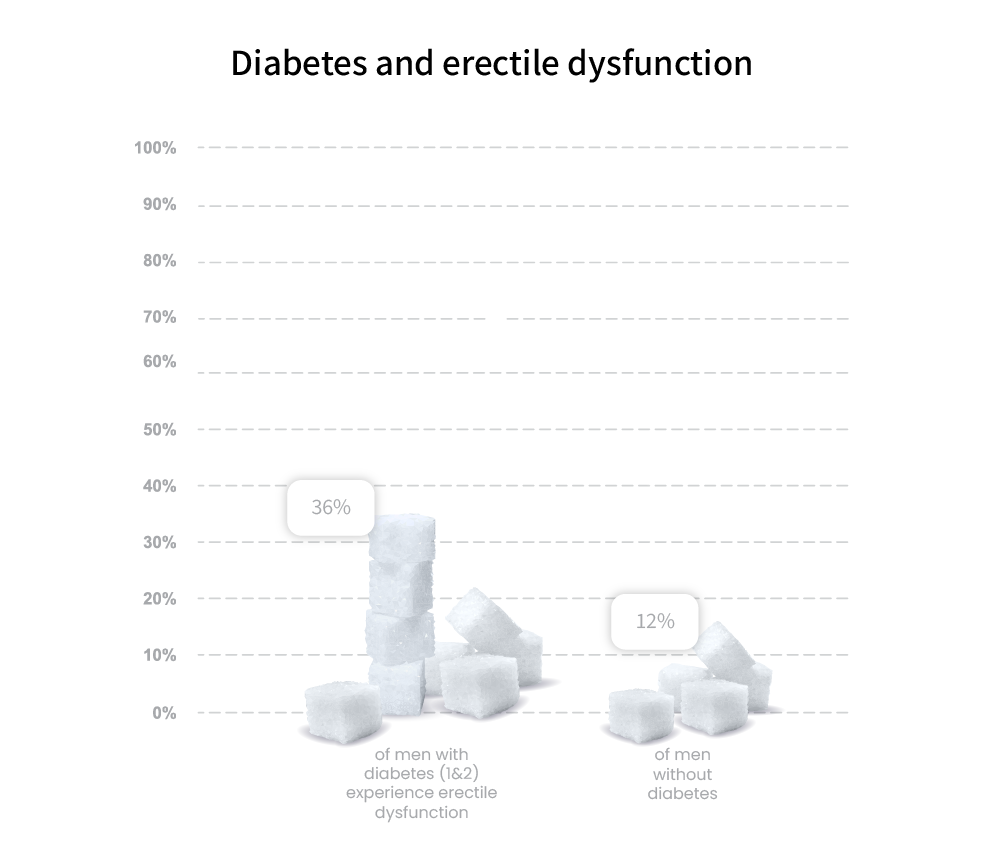Why are diabetic men prone to experiencing sexual dysfunction? How is it manifested and what are the causes? Here is what you need to know about the link between diabetes and male sexual health
Erectile Dysfunction (ED), defined as the inability to maintain an erection sufficient enough for sexual intercourse, is considered a very common problem. We now know that for each decade of life, approximately 10% of men are affected by mild to moderate ED (i.e., 40% of men in their 40s experience ED, 50% of men in their 50s experience ED etc.).
Diabetes is one of the most common diseases in the Western world. In Israel more than 6% of the population have diabetes, with 95% being diagnosed as type 2. This disease can have many complications and ED is currently considered the most significant and common complication in men. However, until recently ED used to be one the most underdiagnosed complication, partly because of the natural reluctance of patients to discuss their sexual problems with the doctor, and partly because of the general misconception that declining sexual function was an inevitable consequence of advancing age or of emotional problems. But diabetes does not have to be a deathblow to the sex life of diabetics. It is possible to protect and improve sexual function by keeping the disease under control and even in cases where there is already an existing dysfunction, there are quite a few effective treatment options.
About Diabetes
Diabetes is a metabolic disease which causes high levels of sugar (glucose) to accumulate in the bloodstream. In healthy individuals, the hormone insulin regulates blood sugar levels by helping glucose from the bloodstream enter into the body’s cells, where it is stored or used for energy. In people with diabetes, however, glucose builds up in the bloodstream instead of entering the cells.
There are two main types of diabetes. Type 1 is an autoimmune disease which causes the destruction of insulin producing beta cells in the pancreas. Without enough active beta cells in the pancreas, there is a limited level of insulin to regulate blood glucose. About 10% of diabetics have this type. Type 2 diabetes occurs when cells become resistant to the insulin the pancreas produces, leading to a buildup of glucose in the blood. Obesity and lack of physical exercise are two primary causes of type 2 diabetes, and there is a direct link between carrying extra weight around the waist, insulin resistance and its ability to regulate blood sugar levels.
Recent studies have shown, that men with type 1 diabetes have an increased risk of developing sexual dysfunction, such as ED and low sexual desire, and that the damage to the erectile mechanism can be somewhat more severe.
The Link Between Diabetes and Erectile Dysfunction
Achieving an erection involves proper functioning of many different body systems, including the nervous system, the endocrine system, the muscles and the cardiovascular system: the brain is involved in sexual arousal, From any sensory stimuli (visual, scent, auditory, taste) or any pleasurable sensations travel arriving from erogenous zones or from the penis along sensory nerves to the brain. The arteries carry a large amount of blood to the penis and initiate the physical change of the penis AKA erection.
Therefore, if there is a problem with any of these organ systems, a man may be unable to achieve or maintain an erection. Psychological factors such as stress and anxiety might likewise cause or worsen the problem, because the brain plays a key role in controlling the body systems responsible for an erection.
Today it is estimated that between 35-75% of diabetic men will experience some degree of ED during their lifetime. This is likely to occur 10-15 years earlier than non-diabetic men, and these numbers only go up as men age. In an extensive study of 1000 diabetic men (both type 1 and type 2), it was found that about 36% of them had ED. This amounts to three times more than the overall prevalence of ED in non-diabetic men.
So what else is important to remember? That the development of diabetes and its manifestation as ED is a gradual process that doesn’t happen overnight, and it is likewise possible to control the disease in order to avoid sexual dysfunction, or to prevent its progression to a more severe form.
Studies have identified several likely causes of ED in diabetic men. These include:
- Damage to blood vessels – long-term high glucose level in the bloodstream can cause damage to the small blood vessels in various organs, which could lead to kidney disease, diabetic neuropathy and loss of vision, among other things. In order to achieve an erection, an increase in blood flow into the corpora cavernosa should occur— the erectile tissues in the penis, which trap blood within. However, when there is a microvascular disease, penile blood flow can become weak, leading to ED. Men with both diabetes and high blood pressure have an increased risk of developing ED because of the additional damage to the small penile blood vessels.
- Nerve damage – High glucose levels may likewise cause nerve damage, especially in the peripheral nervous system which acts as a connector between the central nervous system to the rest of your body, including its extremities.This is the reason why diabetics have peripheral neuropathy (nerve damage) which typically affects their feet and legs, and diabetic men often develop penile nerve damage. This can manifest as ED, loss of sensation, inability to orgasm, pain and discomfort during sexual intercourse and other sexual problems. Diabetes causes damage to both penile and perineal nerves that are responsible for transferring sensory impulses to the brain, which in turn initiates the entire sexual response. Having a relatively good glucose control makes it easier to prevent symptoms from worsening, but once the damage is done, further medical intervention will be required.
- Low testosterone levels – about 25% of diabetic men have low testosterone blood levels. This is because insulin is capable of stimulating testosterone production, and its lacking relates to testosterone levels. This hormone plays a central role in male sexual function, thus low testosterone levels might manifest in ED, including lack of morning erections and also low libido, low energy and depressed mood.
- Psycho-sexual factors – managing a complex disease such as diabetes can be difficult and it often provokes feelings such as stress, anxiety, fear, depression, guilt and anger, all of which are known to affect erections. Depression, for example, can cause sleep deprivation, and consequently loss of morning erections (a natural occurrence in healthy men). Anxiety might likewise cause men to have difficulty achieving an erection or maintaining it during intercourse. Additionally, sexual dysfunction may have mental and emotional consequences which can lead to low self-confidence and self-esteem. An example could be a diabetic man in his 30’s who is under pressure to get his partner pregnant. In these situations, it is possible to get a wider support by treating the sexual problem as well as the psychological one – through psychotherapy or professional sexual therapy.
- Medication side effects – Many diabetic men are treated by multiple medications, to reduce disease-related complications and their risk of developing cardiovascular problems. Some of these medications lower blood pressure and in turn lead to ED, while other medications have physical or psychological side effects, which likewise affect the ability to achieve an erection.

Can Diabetes Cause Other Sexual Problems?
About a third of the men with diabetes suffer from a common nerve damage that causes retrograde ejaculation (often referred to as a “dry orgasm”), which constitutes a major cause of male infertility. In this case, instead of ejaculating through the penis during orgasm, the semen moves backward into the bladder. How does it happen? “Normal” ejaculation involves a complex autonomic activity, but because of the nerve damage associated with diabetes (which can likewise occur following prostate and bladder neck surgery), the bladder neck muscle does not tighten properly. As a result, sperm can enter the bladder instead of being ejected through the penis. Although this condition does not make sex less pleasurable, medical help will be needed to avoid infertility.
In addition, diabetes associated nerve damage can lead to ‘retarded ejaculation’ – a condition which prevents men from getting an orgasm. This symptom occasionally manifests prior to ED, and the form of treatment will be determined following a full medical assessment.
Diabetic men should also look for signs of hypoglycemia (low blood sugar level) following sex, because sexual intercourse is regarded as a form of physical exercise.
In conclusion, diabetic men can lead a pleasurable and satisfying sexual life, though it’s important to seek early medical treatment in order to prevent further irreversible deterioration in their condition. There are various effective treatment options for ED, ranging from highly effective oral medications and vacuum devices to local injections and penile implants.
The Company hereby clarifies that the information contained on the website is for informational purposes only, and is not intended to be a substitute for professional medical and healthcare advice, and does not constitute medical advice or opinion. Always seek the advice of your physician or other qualified health provider with any medical condition or question you may have regarding a medical condition.





